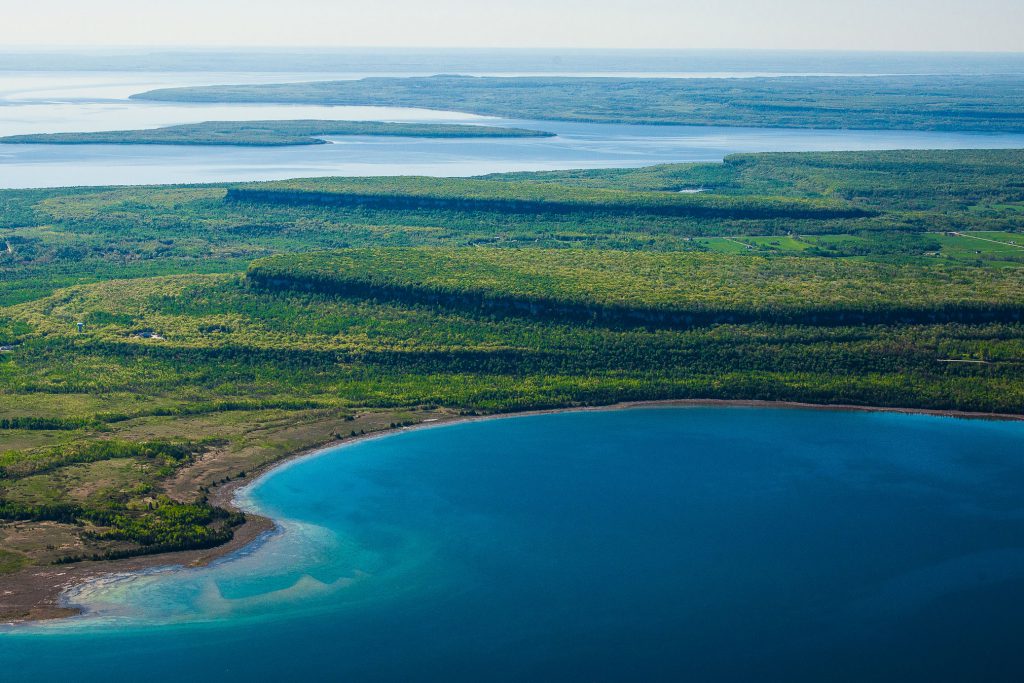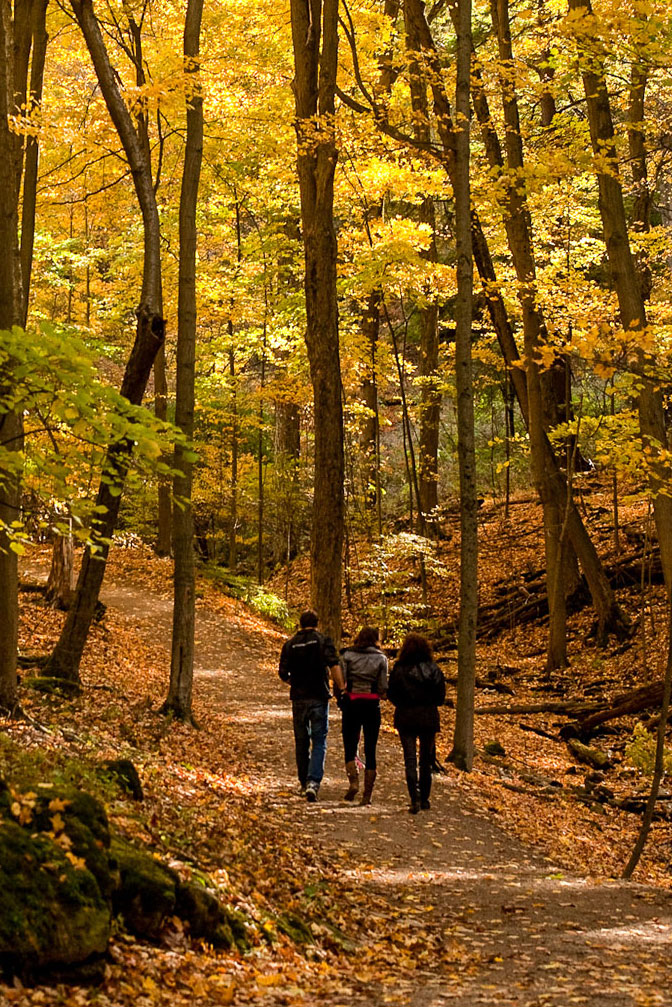GOVERNANCE, MANAGEMENT, AND DECISION MAKING
A Renewed Strategic Management Infrastructure
The Niagara Escarpment Biosphere is managed by the Niagara Escarpment Biosphere Network. A renewed strategic management infrastructure has been developed in partnership with Plenty Canada. The network has established a board of directors that is based upon a co-governance model with Indigenous peoples, and features a diverse group of members from along the Niagara Escarpment from south to north, and north to south.

Board of Directors
Charlene Winger-Jones, is co-chair of the Niagara Escarpment Biosphere Network. She is an elder, Hereditary Council member, Water Walker & Climate Reality Leader, from Neyaashiinigmiing.
Victoria Serda, Mino gezheb, I’m one of the Co-Chairs of our nonprofit board along with Charlene, and am a fourth generation friend and settler ally of the Anishnaabeg around Waussau-Gummauh, now known as Georgian Bay. I live in Saukiing Anishnaabekiing (Saugeen Ojibway Nation territory) in Wiarton with my husband Jaime and daughter Corrina, both of Nahua descent, and grandson Creegan, who is a Band member of the Chippewas of Nawash Unceded First Nation. I have actively been a Climate Leader and Mentor in the Climate Reality Project since 2007, and sit on the board of the Canadian charity. I was honoured to receive the June Callwood Outstanding Achievement for Voluntarism in Ontario Award in 2013 and a Paul Harris Fellow award by the Southampton Rotary Club in 2017. I have a degree in democratic education and a post-graduate certificate in Indigenous Governance and Administration. Having helped found many organizations, such as the Bagida’waad Alliance, SauGreen for the Environment, the Grey Bruce Sustainability Network, and the Niagara Escarpment Biosphere Network, I am happy to share my knowledge with others. I was also an elected Municipal Councillor in Saugeen Shores and a Strategic Advisor to the Band Council of the Chippewas of Saugeen First Nation. My heart is in nature – both with hiking around G’chi Bimadinaa (the Niagara Escarpment) with my family, and hiking in wild places while reconnecting with All Our Relations around us.
Mark Zelinski, trained as an artist and a designer, graduated as the top student of OCAD in 1979. His diverse career as a professional photographer has taken him across 80 countries, with clients ranging from The National Film Board of Canada to Panasonic. He is also a publisher, writer, painter, filmmaker, Fellow of Royal Canadian Geographic Society, member of The Explorer’s Club, and winner of the Canadian Governor General’s Medal. Zelinski is best known for his “Books That Heal” initiative, donating 8,000 copies of his photography books to 100 worldwide charities. His internationally acclaimed photography books include forewords by HRH Prince Philip, The Honourable Lincoln Alexander, AFN Ontario Regional Chief Isadore Day, and Justin Trudeau. Zelinski’s books Heart Of Turtle Island: The Niagara Escarpment and upcoming sequel Niagara Escarpment: Land Between Waters bring exquisite focus to the environmental treasures of the Niagara Escarpment UNESCO World Biosphere, and to the diverse Indigenous and settler communities that thrive along its rugged, curving path. With ten years, ongoing, of extensive experience studying and documenting the Niagara Escarpment, he applies his knowledge in many ways, including as a member of the Board of Directors of the Niagara Escarpment Biosphere Network. www.MarkZelinski.com.
Larry McDermott, Algonquin, is executive director of Plenty Canada, an Indigenous non-government organization devoted to the protection of Mother Earth, building healthy communities, and promoting cross-cultural awareness of the value of Indigenous ways of knowing to achieve a sustainable environment for future generations. He is also a board member of the Niagara Escarpment Biosphere Network. A former three-time mayor and long-time council member of Lanark Highlands, chair of the Rural Forum of the Federation of Canadian Municipalities, and commissioner of the Ontario Human Rights Commission, Larry is a member of numerous organisations including the International Indigenous Forum for Biodiversity, the Ontario Species at Risk Public Advisory Committee, the Canadian Environmental Network, UNESCO, and the Ontario Recovery Strategy for the American Eel. Larry also has served as a comprehensive claim representative for Shabot Obaadjiwan First Nation, is a certified tree marker and butternut assessor, and holds other environmental certifications. He lives in a 170-year-old log home on 500 acres of biologically diverse Algonquin land along the Mississippi River.
Tim Johnson, is a board member of the Niagara Escarpment Biosphere Network, artistic director of The Great Niagara Escarpment Indigenous Cultural Map, artistic producer of Celebration of Nations, and executive producer of the multiple award-winning documentary RUMBLE: The Indians Who Rocked The World. As the former associate director for Museum Programs at the Smithsonian Institution’s National Museum of the American Indian, Tim managed the museum’s largest organizational group across its facilities in Washington and New York. A long list of critically acclaimed exhibits and programs were produced during his tenure, creating an era that significantly advanced the institution’s museology and reputation. Over the course of his work at the Smithsonian Tim edited, conceptualized, and strategically initiated several Smithsonian books showcasing Indigenous art and history. He also established the museum’s Indigenous Community Services department and was co-founder and publisher of the museum’s flagship quarterly membership magazine American Indian, now in its third decade of publication. Among his many highly successful Smithsonian programs was the museum’s Mother Earth Festival, curated and implemented in conjunction with Al Gore’s global Live Earth initiative held on July 7, 2007, which diffused American Indian knowledge and scientific evidence concerning environmental sustainability to thousands in attendance and millions watching around the world. Produced to enhance public education about human induced climate change, it stands as one of the Smithsonian Institution’s most widely viewed public programs. As a leading figure who brought the reality and ramifications of climate change to the forefront in America’s capital, Tim also served on the executive committee of the Smithsonian’s ‘Living in the Anthropocene Initiative,’ a pan-institutional committee formed to advance public education about climate change and the implications of human conduct on the planet.
Caley Patrick Nadjiwon Doran comes from Saukiing Anishinaabekiing territory and he lives in Sauble Beach. He is an Anishinaabe Interpretive Guide with the Cape Croker Park Anishinaabe Cultural Experiences program. After a 20+ year career in the hospitality industry, managing restaurants and large teams, Caley chose a new path connected to his passion for Mother Earth and he now follows the footsteps of his ancestors. You can find Caley guiding hikes and land-based learning across Saugeen Ojibway Nation.
Kerry Kennedy, a passionate educator, enjoys working and volunteering with grassroots organizations in Niagara and along the shores of Lake Huron to protect and restore healthy ecosystems, while educating the next generation of conservationists. Working with the Lake Huron Coastal Centre, she coordinates the Coastal Conservation Youth Corps in the summer, and during the school year works as an outdoor guide at the District School Board of Niagara’s outdoor education centres. Connecting people and nature are themes that also extend through her roles as Past President of the Niagara Falls Nature Club and in her outreach efforts around Twelve Mile Creek, volunteering with the Niagara Chapter of Trout Unlimited Canada. Kerry is a board member of the Niagara Escarpment Biosphere Network.
Leslie Adams has thirty-five years of hands-on experience in the environmental not-for-profit sector and is an energetic organizer of system-wide initiatives, partnership programs, and innovative projects. She has been living adjacent to the Niagara Escarpment since 1996, when she moved from Montreal, Quebec to Georgetown, Ontario. For the past seven years she has been stewarding a small parcel of the Escarpment. Her journey has led her to being involved in sustainability and has participated from the international to the local level. Using international agendas, she strives to enable sustainability and sustainable development, with a particular focus on mainstreaming biodiversity and the Convention on Biological Diversity. She is particularly interested in working to create a BioDiversity Strategy for the Escarpment, as well positioning the Niagara Escarpment Biosphere Network as a land-based platform for members to learn about and take action towards upholding Sustainable Development Goals.
Annette Sandberg is a historical researcher and writer from Simcoe—Grey County, Ontario. Her storytelling comes to life through her Live and Zoom presentations, creative writing, Guided hikes, and Nature photography of the ancient Niagara Escarpment and surrounding area. Annette grew up on the Niagara Escarpment on a 200-acre farm near the Blue Mountains and now resides in nearby Collingwood. Her love for the area developed as a child with curiosity and wonder of the earth, sky, and all living inhabitants of both the land and water. This has led her to research and document the ancient history of the Niagara Escarpment – Ontario’s most prominent Land feature, starting with her 900km trek on the Bruce Trail from Queenston to Tobermory in 2016. In 1990, this ancient land formation was designated a World Biosphere Reserve by UNESCO (United Nations Educational, Scientific and Cultural Organization).
About the Board and the Organization
The Niagara Escarpment Biosphere Network is an incorporated not-for-profit under provincial law. It’s board of directors currently consists of members of the previous Transition Leadership Committee, members of Plenty Canada who are assisting and advising the NEBN in its development, members who have deep experience with UNESCO, and others selected collectively by the Board of Directors for their credentials and capacities to serve our goals and objectives. Several additional positions remain to be filled, which a Governance and Nomination sub-committee will conduct with the involvement of our network partners. Board terms are for three years. The organization’s commitment is to be as transparent as possible while ensuring work gets accomplished efficiently, without political interference, and that reflects diversity, experience, skillsets, professionalism, and functionality.
